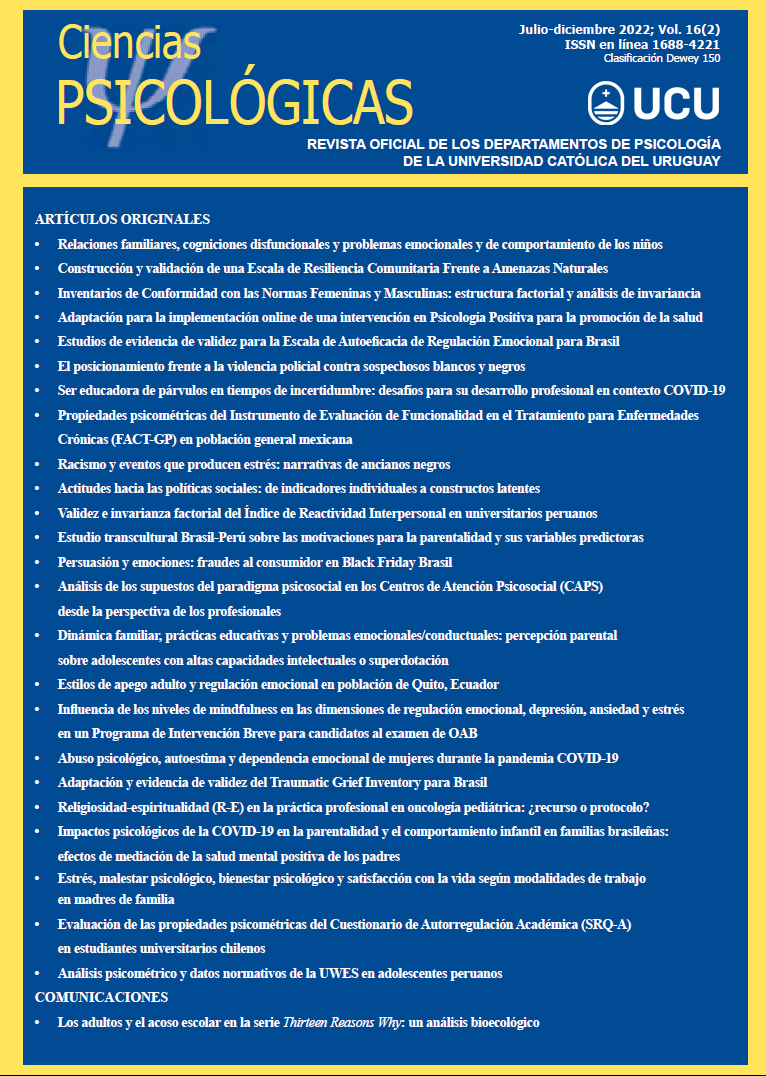Adaptación y evidencia de validez del Traumatic Grief Inventory para Brasil
DOI:
https://doi.org/10.22235/cp.v16i2.2442Palabras clave:
muerte, evaluación psicológica, salud mental, luto, análisis factorial, propiedades psicométricasResumen
El objetivo de este estudio fue verificar la evidencia de validez de la versión reducida adaptada al portugués brasileño del Traumatic Grief Inventory (Inventario de Duelo Traumático), mediante un análisis factorial confirmatorio y la relación con variables externas, además de evaluar la precisión y presencia de invarianza. El primer paso fue la adaptación y evaluación por jueces expertos de la versión traducida. Después de la evaluación, se aplicó la versión piloto a cinco participantes de la población objetivo para la evaluación semántica y de contenido, denominándose Inventario de Luto Traumático (ILT-BR). Luego, 211 brasileños, que pasaron por un proceso de duelo, respondieron los siguientes instrumentos: Cuestionario Sociodemográfico, Cuestionario de Autopercepción de Salud Mental e ILT-BR. El ILT-BR mostró buenos índices de ajuste y precisión, correlacionándose positivamente con el estrés, el miedo y los pensamientos obsesivos, sin encontrar variación entre grupos. A partir de estos resultados, se concluye que el ILT-BR posee propiedades psicométricas adecuadas para su uso en Brasil.
Descargas
Citas
Alexandre, N. M. C. & Coluci, M. Z. O. (2011). Validade de conteúdo nos processos de construção e adaptação de instrumentos de medidas. Ciência & Saúde Coletiva, 16(7), 3061-3068.
American Educational Research Association, American Psychological Association, & National Council on Measurement in Education. (2014). Standards for educational and psychological testing. American Educational Research Association.
American Psychiatric Association. (2013). Diagnostic and statistical manual of mental disorders (DSM-5). American Psychiatric Pub.
Baş, S., Yüksel, Ö., Ülbe, S., & Güngör, D. (2020). Turkish Version of the Traumatic Grief Inventory-Self Report (TGI-SR): validity and reliability. Death Studies, 1, 1-9. https://doi.org/10.1080/07481187.2020.1850551
Boelen, P. A. & Smid, G. E. (2017). The Traumatic Grief Inventory Self-Report Version (TGI-SR): introduction and preliminary psychometric evaluation. Journal of Loss and Trauma, 22(3), 196-212. https://doi.org/10.1080/15325024.2017.1284488
Boelen, P. A., Djelantik, A. A. A. M. J., Keijser, J., Lenferink, L. I. M., & Smid, G. E. (2018). Further validation of the Traumatic Grief Inventory-Self Report (TGI-SR): a measure of persistent complex bereavement disorder and prolonged grief disorder. Death Studies, 43(6), 351-364. https://doi.org/10.1080/07481187.2018.1480546
Borsa, J. C. & Seize, M. M. (2017). Construção e adaptação de instrumentos psicológicos. Em B. F. Damásio & J. C. Borsa (Org.), Manual de desenvolvimento de instrumentos psicológicos (pp. 21-43). Vetor.
Carver, C. S. & Connor-Smith, J. (2010). Personality and coping. Annual Review of Psychology, 61(1), 679-704. http://doi.org/10.1146/annurev.psych.093008.100352
Cortez, P. A., Joseph, S. J., Das, N., Bhandari, S. S., & Shoib, S. (2020). Tools to measure psychological impact of COVID-19 pandemic: What do we have in the platter? Asian Journal of Psychiatry, 53(1), 1-4. https://doi.org/10.1016%2Fj.ajp.2020.102371
Dahdah, D. F., Bombarda, T. B., Frizzo, H. C. F., & Joaquim, R. H. V. T. (2019). Revisão sistemática sobre o luto e terapia ocupacional. Caderno Brasileiro de Terapia Ocupacional, 27(1), 186-196. https://doi.org/10.4322/2526-8910.ctoAR1079
Damásio, B. F. (2012). Uso da análise fatorial exploratória em psicologia. Avaliação Psicológica, 11(2), 213-228.
Damásio, B. F. (2013). Contribuições da Análise Fatorial Confirmatória Multigrupo (AFCMG) na avaliação de invariância de instrumentos psicométricos. Psico-USF, 18(2), 211-220. https://doi.org/10.1590/S1413-82712013000200005.
Dunn, T. J., Baguley, T., & Brunsden, V. (2014). From alpha to omega: a practical solution to the pervasive problem of internal consistency estimation. British Journal of Psychology, 105(3), 399-412. https://doi.org/10.1111/bjop.12046.
Elizur, D. & Shye, S. (1990). Quality of work life and its relation to quality of life. Applied Psychology, 39(3), 275-291. https://doi.org/10.1111/j.1464-0597.1990.tb01054.x
Faul, F., Erdfelder, E., Lang, A. G., & Buchner, A. (2007). G* Power 3: A flexible statistical power analysis program for the social, behavioral, and biomedical sciences. Behavior Research Methods, 39(2), 175-191. http://doi.org/10.3758/BF03193146
Hair, J. F., Black, W. C., Babin, B. J., Anderson, R. E., & Tatham, R. (2006). Multivariate data analysis. Uppersaddle River.
Hu, L. & Bentler, P. M. (1999). Cutoff criteria for fit indexes in covariance structure analysis: Conventional criteria versus new alternatives. Structural Equation Modeling: A Multidisciplinary Journal, 6(1), 1-55. https://doi.org/10.1080/10705519909540118
Lee, S. A. & Neimeyer, R. A. (2020): Pandemic Grief Scale: A screening tool for dysfunctional grief due to a COVID-19 loss. Death Studies, 43(6), 1-11. https://doi.org/10.1080/07481187.2020.1853885
Levin, J. & Fox, J. A. (2004). Estatística para ciências humanas. Pearson.
Maciejewski, P. K., Maercker, A., Boelen, P. A., & Prigerson, H. G. (2016). “Prolonged grief disorder” and “persistent complex bereavement disorder”, but not “complicated grief”, are one and the same diagnostic entity: an analysis of data from the Yale Bereavement Study. World Psychiatry, 15(3), 266-275. https://doi.org/10.1002/wps.20348
Prigerson, H. G., Horowitz, M. J., Jacobs, S. C., Parkes, C. M., Aslan, M., Goodkin, K., Raphael, B., Marwit, S. J., Wortman, C., Neimeyer, R. A., Bonanno, G. A., Block, S. D., Kissane, D., Boelen, P., Maercker, A., Litz, B. T., Johnson, J. G., First, M. B., & Maciejewski, P. K. (2009). Prolonged Grief Disorder: psychometric validation of criteria proposed for DSM-V and ICD-11. PLoS Medicine, 6(8), e1000121. https://doi.org/10.1371/journal.pmed.1000121
Putnick, D. L. & Bornstein, M. H. (2016). Measurement invariance conventions and reporting: The state of the art and future directions for psychological research. Developmental Review, 41, 71-90. https://doi.org/10.1016/j.dr.2016.06.004
Van de Vijver, P. J. R. (2016). Test adaptations. Em F. T. L. Leong, D. Bartram, F. M. Cheung, K. F. Geisinger, & D. Iliescu (Eds.), The ITC International Handbook of Testing and Assessment (pp. 364-376). Oxford University Press. https://doi.org/10.1093/med:psych/9780199356942.003.0025
Ventura-León, J. L. & Caycho-Rodríguez, T. (2017). El coeficiente Omega: un método alternativo para la estimación de la confiabilidad. Revista Latinoamericana de Ciencias Sociales, Niñez y Juventud, 15(1), 625-627.
Descargas
Publicado
Cómo citar
Número
Sección
Licencia
Derechos de autor 2022 Universidad Católica del Uruguay

Esta obra está bajo una licencia internacional Creative Commons Atribución 4.0.
















